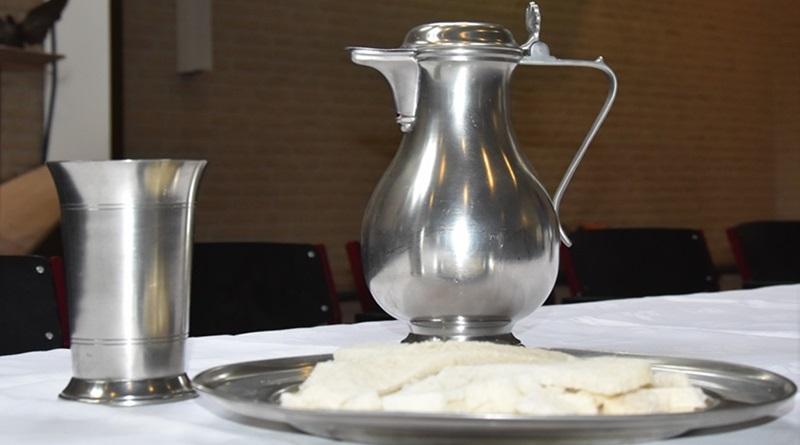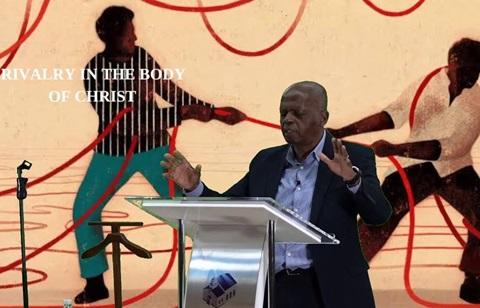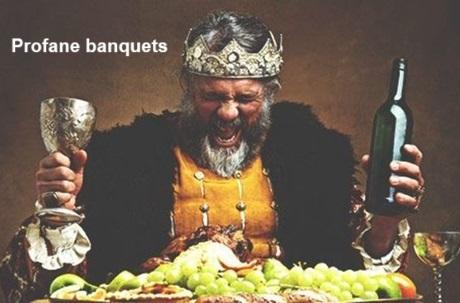1 Corinthians 11:17-34 – The Lord's Supper and the Structure of 1 Corinthians 11:17ff
1 Corinthians 11:17-34 – The Lord's Supper and the Structure of 1 Corinthians 11:17ff

This article seeks to shed light on a key passage for the church’s understanding of the New Testament teaching on the doctrine of the Lord’s Supper, 1 Corinthians 11:20-34, by re-evaluating the structure of vv. 17-34. As a first reaction, this topic might seem esoteric, only distantly related to worship and communion in the pew. That is not the case. How one views the structure from v. 17 through the end of the chapter has a profound effect upon what one reckons to be Paul’s central concern in the Corinthian’s defiling of the Lord’s body and blood (v. 27). That, in turn, impacts one’s understanding of the self-examination Paul demands in v. 28 and what constitutes the goal of that examination, “judging the body rightly,” in v. 29. Those verses are the primary (if not only) biblical basis for key historic elements of Reformed eucharistic liturgy, as evidenced both in the Westminster Standards and the OPC Directory for Public Worship.
Analysis of the Structure of 1 Corinthians 11:17ff⤒🔗
Today’s Consensus vs. Godet←↰⤒🔗
English translations suggest, and commentators of the last century seem to agree with, F.F. Bruce’s division heading, “The Lord’s Supper 11:17-34.”1 A search of numerous commentaries published over the past 150 years suggests that one must go back to 1889 to find an exception. The well-respected Swiss Reformed commentator, Frederic L. Godet, despite similarly entitling vv. 17-34, “Disorders in the Celebration of the Lord’s Supper,” insisted “vers. 18, 19, are not put by the apostle in any connection with the disorders in the Holy Supper.”2 In other words, Godet argues that vv. 18-19 deal with a different problem than that addressed in vv. 20-34. The latter section does indeed rebuke them for abuse of the holy table, but vv. 18-19 rebuke them for “divisions” within their worship services. This article supports and develops Godet’s view of the independence of vv. 18-19 from the Lord’s Supper problems.
Identifying the “Divisions (Schismata)” of vv. 18-19←⤒🔗
If Godet is correct, the unusual term, “divisions (schismata)” (v. 18), is not defined or explicated by vv. 20-34 (the Lord’s Supper problem), but either by vv. 18-19 itself or perhaps by 1:10ff., where the striking term also appears.3 Similarly, Godet’s analysis would preclude reading the problem of divisions into their guilt with respect to the holy supper. In other words, by recognizing a clear break between v. 19 and v. 20, one segregates the problem of divisions from that of the abuse of the Lord’s Table.

In 1 Corinthians 11:18, Paul explicitly affirms the existence of factions “in the assembled church (en ekklesia)” in Corinth. He cites the existence of factions when they “come together” (v. 18a) as his first ground (prooton men gar) for denouncing their gatherings; they assemble (sunerchesthe), he chides, “unto the worse.”4 Yet, aside from asserting their existence as ruining their worship, Paul does nothing in vv. 18-19 to characterize the divisions or to provide evidence for his accusation. If one assumes 11:18 refers to the same factionalism described in 1:10-12–an assumption that has not gone un-challenged–the severe denunciation there shows that Paul judges the divisions to be both real and grave.5 In his final use of the term, 12:25, Paul declares the existence of division in the body of Christ to be contrary to the way that the Spirit has ordered the body. While these two uses of this (for Paul) rare term do not (contra Margaret M. Mitchell) prove the topic of the whole letter to be division, 6 both do presuppose the reader will recall Paul’s earlier case against the rivalries (1:10ff.), and that even in the midst of dealing with other matters, Paul is sufficiently concerned with that problem to take these further opportunities to turn aside and touch on it again.
In 11:18-19, Paul Recounts that←↰⤒🔗
-
he hears (akouoo) that in their assemblies schismata “exist” (ASV). Then,
-
he expresses his qualified (meros ti) credence toward that report, “to some extent I believe it” (NRSV). The common analysis of the discourse flow of 11:18ff. assumes that Paul has forgotten a “second ground.”7
However, for Four Reasons, 11:18 should be Read←↰⤒🔗
-
separate from v. 20ff. and
-
as expressly alluding back to the divisive “rivalries” already described in 1:10-12, with
-
v. 20ff. being Paul’s “next” ground.
-
The word (schismata) is the same and is distinctive; in Paul it appears only in 1 Corinthians (these three verses). Having warned against schismata and pursued the issue for almost four chapters (1:10-4:21), the appearance again of this distinctive term in chapter 11 would readily remind readers (who were themselves experiencing the “existing schismata” weekly) of 1:10ff.
-
By “I hear” in v. 18, Paul again alludes to oral information, that is, to the report from the people of Chloe, the previously expressed source. It was the very report which had provoked the exhortation, “that there may be no schismata among you” (1:10).
-
Verses 18-19 are the first of two reasons for his denunciation of their assembly (“unto the worse”).
“The divisions, schismata, mentioned in vers 18, 19, are not put by the apostle in any connection with the disorders in the Holy Supper [vv. 20ff.], which are explained by a whole different cause… the two subjects cannot have been combined in one by Paul, and both embraced in the prooton men [first of all] of vers 18.”8 -
1 Corinthians 11:18 and 11:20 begin with virtually identical participial phrase constructions that accordingly read naturally as parallel, successive points. This becomes obvious once the interstitial particles (e.g., “for” and “then”) and similar discourse structuring words are struck:
11:18a Proton men gar sunerchomenon umon … “For first, indeed, ye coming together …”
11:20a Sunerchomenon oun umon … “ye, then, coming together…”9
As a blemish on their assembly entirely distinct from the Lord’s Supper (vv. 20ff.) and (hypothetically) distinct from the schismata of 1:10, Paul’s claim to have “heard there are divisions” would sound like little more than giving heed to gossip. It is the earlier probative case–naming witnesses (1:11) and recounting testimony (1:12)–that allows Paul to insert a severe criticism of their worship which, otherwise, would likely appear to be coming out of thin air.10
Thus, 11:18 should (with Mitchell) be understood as referring back to 1:10. Like vv. 20-34, it explains v. 17b, yet it is distinct from the Lord’s Supper issue. They are two separate but serious blemishes on their worship services. Thus, Godet’s case for a divide between 11:19 and 20 is established. For once the factional issue in 11:18-19 is clearly identified as the same as that of 1:10-12, it cannot fit the Lord’s Supper problem of vv. 20ff. (this was Godet’s point).

Implications for Understanding Paul’s Lord’s Supper Teaching (11:20ff.)←⤒🔗
Since plural of schisma in v. 18 is a reference back to the multiple factions of 1:10-12, it cannot be a description of the single division (rich/poor) that many today (such as Fee) believe to be at the heart of the Lord’s Supper-related excoriation (e.g., v. 22b, “Or do you despise the church of God?”, NASB). The recent trend to see Paul as primarily concerned with mistreatment of the poor is misguided. Calvin’s view is closer to the mark, “the abuse that had crept in among the Corinthians as to the Lord’s Supper … their mixing up profane banquets with the sacred and spiritual feast, and that too with contempt for the poor.” With vv. 18-19 rightly segregated from vv. 20-34, the latter section opens and closes with the apostle proscribing what Calvin calls their “profane banquets” (Paul: “each one takes his own supper,” 11:21; “if … hungry … eat at home,” 11:34) from the time and place of the sacred assembly.
The central meaning of the sacred rite proclaiming the Lord’s death until he comes again had been obscured to the point that many no longer discerned the Lord in the elements (v. 20b).11 It is “for this cause many are weak …” Verses 18-19 are thus “first of all,” with v. 20 beginning the “next” of the discourse; each (first and next) explains independently why Paul believed they were “coming together for worse.” The problem at the Lord’s Table at Corinth was not “divisions” – that criticism was a part of point #1, not #2 – but a failure to remain cognizant of the Lord’s body and blood in the bread and wine, with the result that Paul judged that when they meet, “it is not to eat the Lord’s Supper” (NASB; NKJV). With awareness of the Lord’s death gone from the sanctified elements, they turned the sacred meal into an ordinary dinner party, and one at which some were largely left out. The offense to the Lord’s body and blood was primary; the offense to the poor among his church caused what might be termed secondary damage.
Conclusion←⤒🔗
The crucial point that is clarified is this: in 1 Corinthians 11 the essence of what distinguishes eating profane bread and wine over against the Lord’s body and blood is not the time or the place. It is not the presence or officiation of elders or minister – an issue not addressed. It was not even their coldness toward their hungry brethren – a concern mentioned in passing. In 1 Corinthians 11 that which (alone) distinguishes the sacred meal from the profane, that which makes the meal truly “the Lord’s Supper” (or not), is the self-conscious partaking of the Lord on the part of those eating and drinking. Precisely by eating without that discernment of the Lord’s body in the meal, they profaned the Lord’s Supper, and ate and drank judgment to themselves. Surely if we agree that the apostle’s teaching on the essence of the supper is to govern our church’s practice, we, too, must instruct all whom we welcome to the Lord’s Supper that they can, and indeed they must, self-consciously partake not merely of bread and wine, but of the crucified Savior and if they lack such faith and discernment they approach the table at their own peril.

Worthy receivers … inwardly by faith, really and indeed, yet not carnally and corporally but spiritually, receive, and feed upon, Christ crucified, and all benefits of His death: the body and blood of Christ being then … spiritually present to the faith of believers in that ordinance, as the elements themselves are to their outward senses. (WCF 29:7)
Paul’s remedy for their having turned the Lord’s Supper into their own meal (vv. 20-21) is to order that the ordinary meal be completely separated from the Lord’s Supper (vv. 22, 34). Accordingly, that continues to be the practice of churches in our day. What of our church-wide luncheons following our services? Perhaps that is a topic best left for another article.

Add new comment